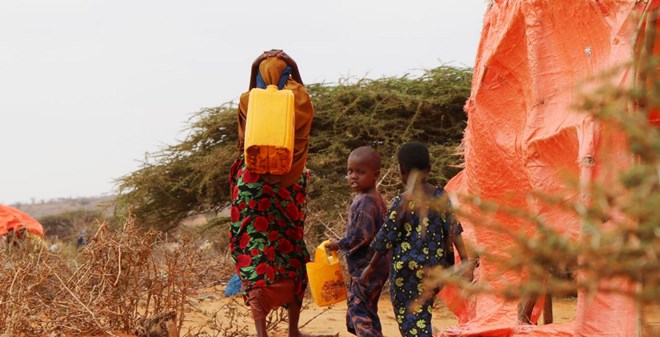
Sunday March 6, 2022

Ninety per cent of Somalia is experiencing critical drought. To date, more than 4.3 million people are have been severely impacted, facing life-threatening water shortages and rising food prices.
Hundreds of thousands of people have already fled their homes, creating a displacement crisis, with numbers projected to rise to 1.4 million. The Norwegian Refugee Council (NRC) and partners are responding, but international support is falling short.
Wrapped in a pink hijab, Rahma Omar sits inside a makeshift shelter made of old clothes, sticks and ropes. It struggles to withstand strong gusts of wind and provides only a little protection from the sun and the heat.
Rahma’s one-year-old son, Adan, sits next to her crying for food and milk. At 29, Rahma is responsible for the care of her eight children – alone, without support.
In the past, she has earned enough money from farming to feed and protect her children. However, three failed rainy seasons have made this impossible.
“I had a big farm and livestock back in my village, which is around 220 kilometres away from here,” she says. “Everything was good for us. I was able to sustain my family and also feed my children without any difficulties.
“I had about 50 cows and 32 goats, and this was my family’s primary source of income. But the drought and the lack of rain made it difficult to feed my children.
“I lost all my livestock. I still recall that tragic time in our village, and our long journey to Kismayo town.”
In a country where the average income is just USD 870 a year, the loss of almost USD 15,000 worth of livestock – Rahma’s only source of income – will take years to recover.
A dangerous journey
Desperate for assistance, Rahma and her children left their home on a donkey cart. They were forced to undertake a dangerous journey through rural areas, across land fought over by government forces and Al Shabaab. Her last few remaining cattle accompanied them.
Four of Rahma’s children fell seriously ill due to malnutrition. “It was a horrific journey,” she says. “We slept on the roads, exposed to the risk of deadly animals. We could not bear the hunger. Sometimes we resorted to begging for food.”
Thankfully, all her children survived. But her remaining livestock did not. Some died along the way, and some had to be abandoned.
After the 220 km journey, Rahma decided to settle in Luglow settlement, on the outskirts of Kismayo town.